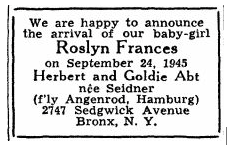What questions do you have about Judaism? Submit them online, or fill out the form below.
Do Jews hate Germans?

My family’s ties to Germany go back to my grandmother’s youth and young adulthood in Hamburg, a large northern port city. Like countless other German Jews, she was forced to flee when Hitler’s Third Reich violently persecuted Jews and many other minority groups that didn’t fit into his Aryan dreamworld. My “Oma Goldie,” born Golda Seidner in 1911, came to New York City sponsored by the Hebrew Immigrant Aid Society, which helped quite a few European Jews escape the Nazis and build a new life in America. She eventually met Herbert Abt, also a German Holocaust survivor, and they married. In 1945, my mother, Roslyn, was born:

My own relationship with Germany is very positive. I attended kindergarten and third grade in German public schools in Freiburg. My family also spent part of nearly every summer there until I was a teenager. As a third-grader, I was the first Jewish student ever to attend the Anne-Frank-Grundschule (i.e., Anne Frank Elementary School).
There was a huge picture of Anne on the wall in the hallway as you entered the school. With my arrival, the other students were finally able to meet and get to know a Jew. I remember being treated very well by my classmates, who had a healthy curiosity typical of young children about what it was like to be Jewish and American. True, when the other kids went to Catholic or Protestant religion class, I attended gym class with the second-graders, as there was no Jewish religion class. But as a young Jew in Germany, I had a happy life.
The last time I visited Germany was the year 2000, during a semester abroad in Spain. I went for spring break and visited my third-grade teacher at the Anne Frank school, Frau Balig. She remembered me and had me talk to her students about America and Spain.
Returning to Germany as an adult felt like a homecoming, and indeed, Freiburg was and remains my family’s second home, full of friends and happy memories. Next year, if all goes well, my family will take a trip to Israel — my first — and then Freiburg. I’m looking forward to introducing my wife and 1-year-old son to the place that so meaningfully and beneficially influenced my childhood and current way of being.
Due to my father’s decades of work in relation to German culture, when the Berlin Wall finally fell, the German government sent him a big, colorful piece of it, encased in some kind of hard plastic and bearing the inscription: “You helped bring this wall down.” As my father’s Wikipedia entry indicates: “Schindler’s leadership of Wayne State’s Junior Year in Freiburg and Junior Year in Munich study-abroad programs (he served as director of both from 1975 to 1993) earned him the Bundesverdienstkreuz, erster Klasse,Germany’s highest civilian honor.”
I recognize that not every Jewish family has the fond feelings toward Germany that mine does. But I greatly value the fact that after something as horrific as the Holocaust, the Schindlers have been able not only to make peace with Germany but to re-incorporate it meaningfully into our lives and family identity.








